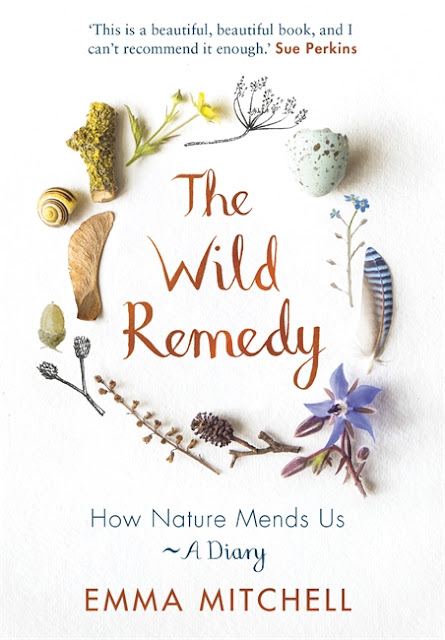I recently finished reading “The Wild Remedy - How Nature Mends Us - A Diary” by Emma Mitchell .... see her excellent Instagram page here.
Emma’s book is remarkable in so many
respects.
Emma provides a candid and honest account of her own mental health issues having suffered from depression for 25 years or, as she calls it, "the grey slug’". In 2009, the stresses of a city job became too much and she decided to move her family in to a cottage in the Cambridgeshire Fens. She swapped days in the office for walks in the countryside around her new home, photographing, collecting and drawing as she went. Each walk lifted her mood and she began to feel better, her encounters with nature and wildlife proving to be as effective as any prescribed therapy or drug.
Charting her own seasonal highs and lows and reflecting on how these encounters with nature and wildlife impact on her mental health, Emma explains the science and biochemistry behind such changes …. the “wild remedy”. Her book is a powerful testament to how reconnecting with nature may offer some answers to the mental health issues that so many people experience.
In essence, low moods, depression, etc. are often caused by high levels of the stress hormone cortisol combined with low levels of the feel-good neuro-transmitters serotonin and dopamine. This mix can be altered by walking among trees, plants and wildlife: cortisol decreases while serotonin and dopamine increase.
Serotonin is
increased by sunlight, even in winter or when it is cloudy, and by gentle
exercise. Dopamine levels can be boosted by encountering nature and wildlife
and even by looking at scenes of nature and wildlife that you consider to be
beautiful.
Most of Emma’s book is not about the science but instead it is a month-by-month diary of nature therapy. It describes her walks close to her
home in the Cambridgeshire Fens with her much-loved dog Annie but also to places away from her home on the coast.
Emma's diary records what she sees, hears and finds as she follows the paths and trails around her cottage and further afield, sharing her discoveries and tracking the lives of the local flora and fauna over the course of a year. It shows how being in the wild can benefit both mental and physical wellbeing. The nature and wildlife she records are very much the common species that are easy to find. On her lowest days when a walk is not an option, Emma remains in contact with nature and wildlife through time spent in her garden or just looking out of her cottage window.
The book is beautifully hand-illustrated with Emma’s own paintings and sketches and also includes some of her photos.
Finally, I discovered a quote in Emma’s book from Alice Walker .... “I understood at a very early age that in nature, I felt everything I should feel in church but never did. Walking in the woods, I felt in touch with the universe and with the spirit of the universe."
This is particularly meaningful for me. For much of my life, I was sceptical but basically agnostic about the existence of any "god" and especially doubtful about the merits and motives of any organised religion given the evidence of human history. In recent years, I have been entirely comfortable in my position and beliefs as an atheist, humanist and secularist. However, that does not mean that I do not feel any spiritual experience from engaging with nature and wildlife or that I can not appreciate sacred music or the architecture of religious buildings.
Stay safe, stay well, stay strong, stay connected with nature






No comments:
Post a Comment
If you feel like commenting on my blog, you can contact me by completing the comment form below. I will respond to all comments and enquiries and constructive criticism will always be welcomed.